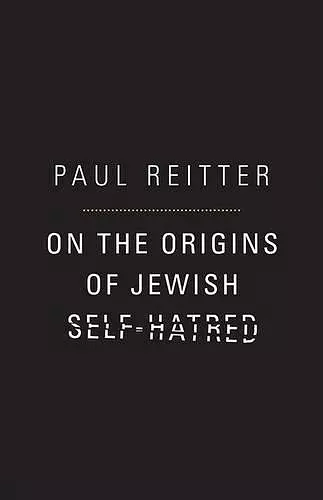On the Origins of Jewish Self-Hatred
Format:Hardback
Publisher:Princeton University Press
Published:4th May '12
Currently unavailable, and unfortunately no date known when it will be back

Today, the term "Jewish self-hatred" often denotes a treasonous brand of Jewish self-loathing, and is frequently used as a smear, such as when it is applied to politically moderate Jews who are critical of Israel. In On the Origins of Jewish Self-Hatred, Paul Reitter demonstrates that the concept of Jewish self-hatred once had decidedly positive connotations. He traces the genesis of the term to Anton Kuh, a Viennese-Jewish journalist who coined it in the aftermath of World War I, and shows how the German-Jewish philosopher Theodor Lessing came, in 1930, to write a book that popularized "Jewish self-hatred." Reitter contends that, as Kuh and Lessing used it, the concept of Jewish self-hatred described a complex and possibly redemptive way of being Jewish. Paradoxically, Jews could show the world how to get past the blight of self-hatred only by embracing their own, singularly advanced self-critical tendencies--their "Jewish self-hatred." Provocative and elegantly argued, On the Origins of Jewish Self-Hatred challenges widely held notions about the history and meaning of this idea, and explains why its history is so badly misrepresented today.
"[T]he author does a fine job of placing Kuh and Lessing in personal and historical contexts, and he clearly contrasts their ideological notions of Jewish self-hatred with the more psychological slant of such contemporary thinkers as Peter Gay, Sander Gilman, and Shulamit Volkov."--Publishers Weekly "[S]hort and ambitious... Of particular interest is Reitter's analysis of the impact of World War I: it gave renewed focus to the so-called Jewish question in Europe and spurred Koh's and Lessing's work... [On the Origins of Jewish Self-Hatred] should be in every library with a serious Jewish studies collection."--Library Journal "His arguments are convincing; however, while the book is short, readable, and enlightening, it is a work of scholarship--Reitter assumes the reader is familiar with the previous work on the topic. At times I felt like I was at a dinner party where everyone was gossiping about people I had never heard of. Reitter's excellent book is an inadvertent reminder of how the Germans pulverized their own intellectual life."--Gordon Haber, Religion Dispatches "With this book ... Reitter has established himself as a leading authority on German-Jewish relations between the wars. Valuable."--Choice "On the Origins of Jewish Self-Hatred is a substantive and sophisticated work."--Glenn C. Altschuler, Jerusalem Post "[A] slim, intriguing volume."--Ben Cohen, Jewish Ideas Daily "I highly recommend Reitter's essay both for the light it shines on interwar Jewish intellectual culture in Vienna and for its intervention in the study of Jewish self-hatred. From now on, any scholar interested in using or critiquing the term must reckon with Reitter's findings."--Amos Bitzan, H-Net Reviews "Paul Reitter ... has an acutely sharp axe in his intellectual probing of the syndrome that surfaces so often in the contemporary debate on Jewish self-hate... The troika of Jewish thinkers who inhabit Reitter's formidable study, tried to navigate the dangerous shoals of modern German history and its impact of German Jews. In resuscitating the complex arguments they offered in their explanation of Jewish self-hate, Reitter has performed a valuable exercise--for which we are in his debt."--Arnold Ages, Jewish Tribune
ISBN: 9780691119229
Dimensions: unknown
Weight: 340g
176 pages